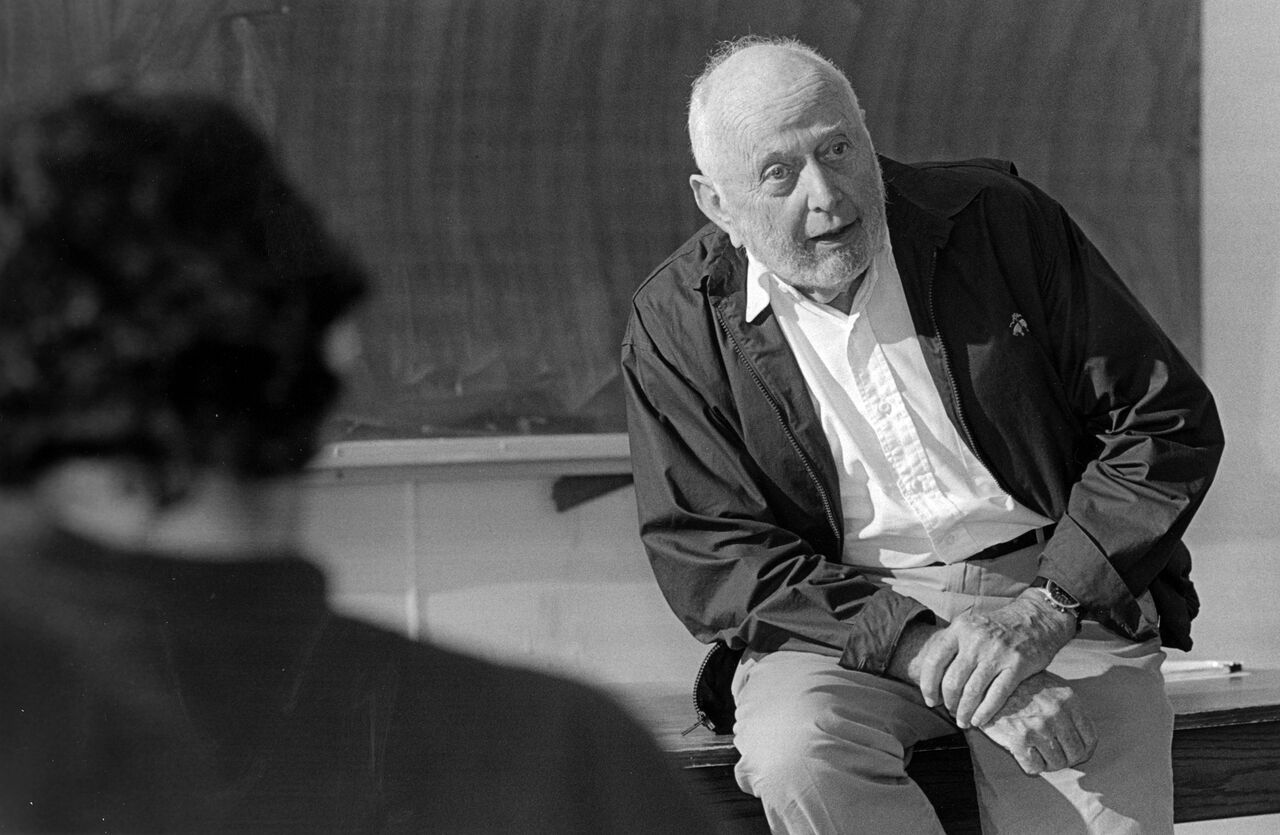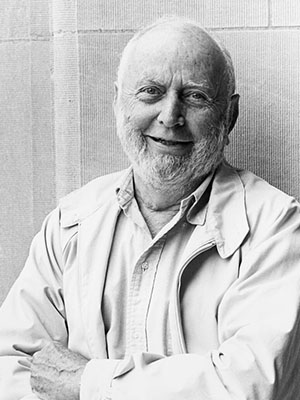
Douglass C. North, PhD, co-recipient of the 1993 Nobel Memorial Prize in Economic Sciences and the Spencer T. Olin Professor Emeritus in Arts & Sciences at Washington University in St. Louis, died Monday, Nov. 23, 2015, at his summer home in Benzonia, Mich. He was 95.
An economic historian, North examined the formation of political and economic institutions and the consequences of these institutions on the performance of economies through time.
In 1993, North and Robert Fogel, PhD, then an economist with the University of Chicago, won the Nobel in economic sciences “for having renewed research in economic history by applying economic theory and quantitative methods in order to explain economic and institutional change.”
During his academic career, which spanned more than 60 years, he pondered complex variations of a simple question: Why do some countries become rich, while others remain poor?
His work shed new light on economic development in Europe and the United States before, and in connection with, the industrial revolution.
“Doug North, Washington University’s renowned and beloved Nobel laureate, was of course an innovative and groundbreaking thinker, writer and scholar,” Washington University Chancellor Mark S. Wrighton said. “But he was also the very best of what we all aspire to be — a thoughtful man, a kind colleague, a generous university citizen. He was a joy to be around and he will be deeply missed by me and so many others in the Washington University community.”

Born in Cambridge, Mass., North graduated with a triple bachelor’s degree in political science, philosophy and economics from the University of California, Berkeley, in 1942, and later, in 1952, earned a doctorate in economics there. He served as a U.S. Merchant Marine from 1942-46.
North joined Washington University in 1983 as the Henry R. Luce Professor of Law and Liberty in the Department of Economics in Arts & Sciences after serving 33 years on the economics faculty at the University of Washington in Seattle. His tenure at the University of Washington included 12 years as department chair and five years as director of the Institute for Economic Research.
At Washington University, he served as director of Arts & Sciences’ Center in Political Economy from 1984-1990.
He was deeply involved in the new and growing branch of economics called institutional economics, which draws heavily on his work and that of fellow Nobel laureate Ronald Coase.
In 1999, North founded the university’s Center for New Institutional Social Sciences to foster research into the evolution of social, political and economic institutions that shape societies and economies around the world.
For more than 20 years, John N. Drobak, JD, the George A. Madill Professor of Law and professor of economics and political economy in Arts & Sciences, co-taught with North the “Theory of Property Rights” for both economics and law students. Drobak noted North’s devotion to his students.
“I quickly learned how much Doug loved his students,” Drobak said. “He enjoyed pushing them in the discussions in class, and he liked it when students disagreed with him. Doug not only taught economics, but he also used economics to teach critical thinking. He wanted his students to learn to think for themselves, rather than just accepting what they read.
“Doug had a warmth for his students that made it easier for them to talk with him. I think many were intimidated at first by having a Nobel laureate as a teacher, but his wit and humility in class helped the students get over that quickly,” said Drobak, who recalled that on the day North learned of his Nobel Prize, he insisted on teaching his class despite all the media interviews and celebrations going on that day.

He remained active in teaching and research at Washington University until his health began failing over the past few years.
In 1987, he was elected to the American Academy of Arts and Sciences, and, in 1992, he became the first economic historian to win one of his profession’s most prestigious honors, the John R. Commons Award.
He was elected a Fellow of the British Academy in July 1996 and installed as the first Spencer T. Olin Professor in October 1996. He received the university’s William Greenleaf Eliot Society “Search” Award in April 2002 and an honorary doctor of science at the university’s Commencement ceremony in 2003.
North was the author or co-author of 10 books, including “Structure and Change in Economic History” (1981); “Institutions, Institutional Change and Economic Performance” (1990); and his most recent, “Violence and Social Orders: A Conceptual Framework for Interpreting Recorded Human History” (2009).
Washington University Chancellor Emeritus William H. Danforth, who welcomed North to campus in 1983, said North’s contributions to economic understanding reflect only one dimension of his lasting legacy.
“I am sad at the passing of Doug North, one of Washington University’s most gifted and admired academics,” Danforth said. “For decades, until near the end, he used the tools of economics and economic history to understand better how the world really works.
“In 1993 he was recognized for his work with the Nobel Prize in Economic Science. That that was only one side of Professor North. He was an dedicated teacher for undergraduate and graduate students, faculty, alumni, friends and even chancellors. We will miss him; the world will miss him,” Danforth said.
For more than a quarter of a century, North and his wife, Elisabeth Case, spent summers in northern Michigan, where he would work on his research in the morning, and then hike with his dog, play tennis or go swimming in the afternoon. Many evenings were spent listening to music at the nearby Interlochen Music Camp.
While research was a fundamental focus of his life, he noted in a biographical sketch that research “has been intermingled with a variety of activities that have complemented that central preoccupation and enriched my life.
“I continue to be a photographer; I have enjoyed fishing and hunting with a close friend; and have owned two ranches, first in northern California and then in the state of Washington. I learned to fly an airplane, and had my own airplane during the 1960s. I have always taken seriously good food and wine. In addition, music has continued to be an important part of my life.”
North is survived by Elisabeth, his wife of 43 years; three sons, Douglass of Seattle, Wash., Christopher of Palm Springs, Calif., and Malcolm of Davis, Calif.; and four grandchildren.
A memorial service is being planned and details will be anounced later.
Comments and respectful dialogue are encouraged, but content will be moderated. Please, no personal attacks, obscenity or profanity, selling of commercial products, or endorsements of political candidates or positions. We reserve the right to remove any inappropriate comments. We also cannot address individual medical concerns or provide medical advice in this forum.